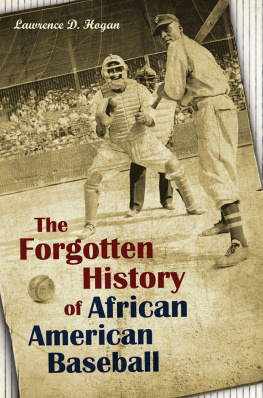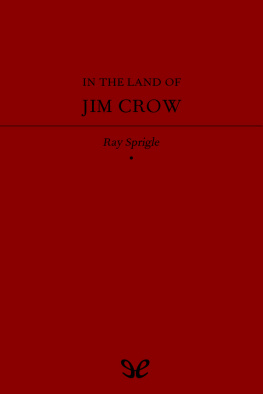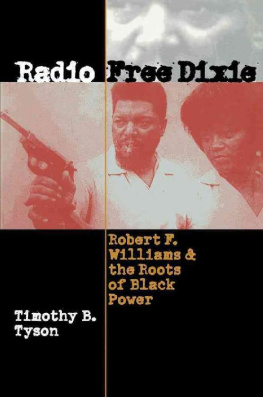About the Author
Bill Steigerwald spent thirty-five years as a newspaperman. The 1969 Villanova University history major started his career in 1973 as an associate editor of the Mt. Washington Press in suburban Cincinnati. Next stop was Hollywood, where he worked briefly for CBS-TV as a docudrama researcher before working for the Los Angeles Times. He was a copy editor, freelance writer, and letters editor in the Times Sunday Calendar arts and entertainment section until 1989, when he returned to Pittsburgh. He worked as a reporter, Sunday feature writer, and weekly columnist at Ray Sprigles old paper, the Pittsburgh Post-Gazette, until 2000. In 1998 he retraced part of the journey Sprigle and his companion, John Wesley Dobbs, made across the South fifty years earlier for an article in the Post-Gazette. In 2000 he moved across town to the Pittsburgh Tribune-Review. There he was an associate editor, weekly op-ed columnist, editorial writer, feature writer, letters editor, book-page editor, and weekly interviewer of important newsmakers, politicians, authors, and celebrities. After a million or two words under his byline, he retired from newspapers in 2009. His interviews and libertarian op-ed columns were nationally syndicated for about five years by CagleCartoons.com and TownHall.com. His freelance stories, interviews, and opinion pieces have appeared in dozens of major American papers and in magazines as disparate as Reason, Family Circle, and Penthouse. In 2013 he self-published Dogging Steinbeck, an investigation into John Steinbecks iconic Travels With Charley road trip in 1960. Steigerwald has five kids Michelle and John in San Francisco, Billie in Brooklyn, and Joe and Lucy in Pittsburgh. He and his wife, Trudi, live on a hilltop in the woods south of Pittsburgh.
Bibliography
INTERNET
This book would not have been possible without the Internet. It allowed me to find and read everything from Harry Trumans personal letters and 1950 US Census reports to American Mercury articles, postcards for old hotels, and the top speed of a 1947 Mercury. The website Newspapers.com allowed me to read and search virtually every copy of the Pittsburgh Post-Gazette, Pittsburgh Courier, and the Delta Democrat-Times from 1920 to 1960.
ARCHIVES
Amistad Research Center
John Wesley Dobbs Family papers
Beinecke Rare Book & Manuscript Library
Walter Francis White and Poppy Cannon Papers
Carnegie Museum of Art
Teenie Harris Archive
Harry S. Truman Library & Museum
Truman papers
John Heinz History Center
Ray Sprigle papers
King Library & Archive
Martin Luther King Jr. archives
Library of Congress
NAACP papers
Mitchell Memorial Library, Mississippi State University
Hodding Carter papers
New York Public Library
Town Hall Meeting of the Air papers
Rita and Leo Greenland Library & Research Center
Anti-Semitism in the United States, 1947
NEWSPAPERS AND MAGAZINES
American Mercury
Atlanta Daily World
Atlantic Monthly
Chicago Defender
Chicago Tribune
Commentary
Delta Democrat-Times
Ebony
Editor & Publisher
Fortune
Jet
Life
Nation
National Review
New York Herald Tribune
New York Times
New Yorker
Newsweek
Pitt Magazine
Pittsburgh Courier
Pittsburgh Post
Pittsburgh Post-Gazette
Pittsburgh Press
Portland Oregonian
Red Book Magazine
Seattle Daily Times
Smithsonian Magazine
St. Louis Dispatch
The Saturday Review
Time
Town Meeting Bulletin
Books
Bean, Jonathan, ed. Race & Liberty in America. Lexington: University of Kentucky Press, 2009.
Carter, Hodding. Southern Legacy. Baton Rouge: Louisiana State University Press, paperback, 1966.
Egerton, John. Speak Now Against the Day: The Generation Before the Civil Rights Movement in the South. Chapel Hill: University of North Carolina Press, 1995.
Ferguson, Jeffrey B. The Sage of Sugar Hill: George S. Schuyler and the Harlem Renaissance. New Haven: Yale University Press, 2005.
Ghiglione, Loren, CBSs Don Hollenbeck: An Honest Reporter in the Age of McCarthyism. New York: Columbia University Press, 2008.
Ghiglione, Loren, ed. Radios Revolution: Don Hollenbecks CBS Views the Press. Lincoln: University of Nebraska Press, 2008.
Griffin, John Howard. Black Like Me. New York: New American Library, 2003.
Gunther, John. Inside U.S.A. New York: Harper & Brothers, 1947.
Janken, Kenneth Robert. White: The Biography of Walter White, Mr. NAACP. New York: The New Press, 2003.
Myrdal, Gunnar. An American Dilemma: The Negro Problem and Modern Democracy. New York: McGraw Hill, paperback, 1964.
Pietrusza, David. 1948: Harry Trumans Improbable Victory and the Year That Transformed America. New York: Union Square Press, 2011.
Pomerantz, Gary M. Where Peachtree Meets Sweet Auburn: The Saga of Two Families and the Making of Atlanta. New York: Scribner, 1996.
Roberts, Gene, and Hank Klibanoff. The Race Beat: The Press, the Civil Rights Struggle, and the Awakening of a Nation. New York: Vintage Books, 2007.
Savage, Barbara Dianne. Broadcasting Freedom: Radio, War, and the Politics of Race, 19381948. Chapel Hill: University of North Carolina Press, 1999.
Schuyler, George S. Black and Conservative: The Autobiography of George S. Schuyler. New Rochelle, NY: Arlington House Publishers, 1966.
Sheffer, Alan Guy. Investigative Reporter: Ray Sprigle of Pittsburgh. Dissertation, Pittsburgh: Carnegie-Mellon University, 1973.
Sprigle, Ray. In the Land of Jim Crow. New York: Simon and Schuster, 1949.
Thomas, Clarke M. Front-Page Pittsburgh, Two Hundred Years of the Post-Gazette. Pittsburgh: University of Pittsburgh Press, 2005.
Waldron, Ann. Hodding Carter: The Reconstruction of a Racist. Chapel Hill, NC: Algonquin Books of Chapel Hill, 1993.
White, Walter. A Man Called White, The Autobiography of Walter White. Athens: University of Georgia Press, 1995.
White, Walter. How Far the Promised Land? New York: Ams Pr Inc, 1955.
Williams, Juan. Eyes on the Prize. New York: Penguin Books, 2013.
Woodward, C. Vann. The Strange Career of Jim Crow. Oxford: Oxford University Press, 2002.
INTERVIEWS
Jordan Arline
Juliet Dobbs Blackburn-Beamon
John Brewer
June Dobbs Butts
Rod Doss
David Gillarm
Dorothy Haslerig
Willie Haslerig
David Jackson
Mattiwilda Dobbs Janzon
Robert Bobby Jordan
Rae Sprigle Kurland
Norman Wolken
CHAPTER 1 Jim Crow, U.S.A.
The two black men racing past the cotton fields in their 1947 Mercury were up to no good. Because their enormous dark green and chrome sedan attracted unwanted attention, they had to be cautious and alert as they crossed the Deltas vast grid of dirt roads and cotton plantations. No one white knew who they were or why they were in Mississippi, and they had to work extra hard to hide their sophistication and curiosity. The night before they drove into the Delta, friends in Jackson had briefed them on tactics, strategy, and proper behavior, as if they were a pair of elderly saboteurs about to be dropped into Nazi-occupied France.
The men were warned not to stop and speak to sharecroppers working or walking along the roads. They were told never to argue with the riders who made up the armed mounted patrols that plantation owners used as field foremen and general overseers. They were also told not to talk too much in front of the white folks who held all the power and owned everything of value in the Delta. Above all, they were warned not to appear too interested in the dismal living conditions and suppressed civil rights of the huge black workforce that served King Cotton.





